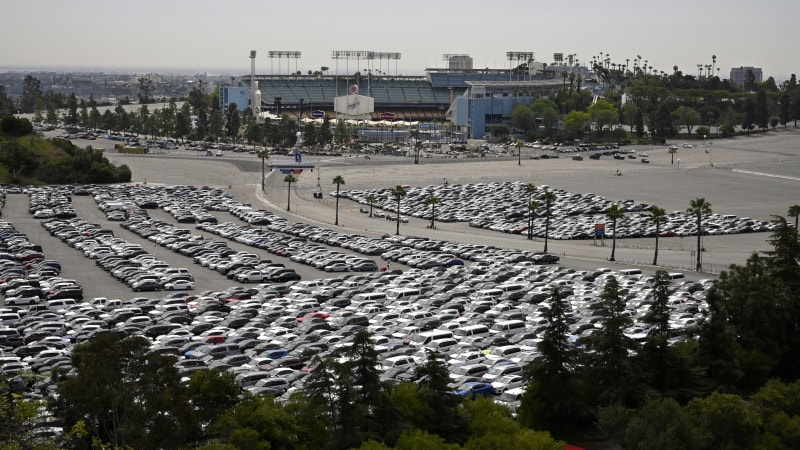
Unused rental cars are stored in the parking lot of Dodger Stadium in Los Angeles. Dodger Stadium and Angel Stadium are housing the cars as companies are left with a surplus of unused vehicles and limited capacity to store them. (AP Photo/Mark J. Terrill)
The collapse in demand for new vehicles from U.S. rental car fleets hit automakers hard in May, even as consumer sales were stronger than expected and coronavirus stay-at-home orders began to ease.
The collapse of air travel has pushed big car rental companies to cancel orders for new vehicles, punching a hole in sales for nearly a dozen U.S. automakers’ including the Big Three in Detroit.
Hyundai Motor Co’s U.S. sales arm said Tuesday that its sales to fleets, including rental companies, fell by 79% in May, while retail sales grew by 5%.
Automakers could lose up to 12% of their annual U.S. vehicle sales in 2020 as car rental companies slammed by the coronavirus pandemic slash fleets and restructure, according to Jefferies.
The retreat by rental car companies threatens production and jobs at U.S. factories that build vehicles popular with rental car fleets such as Hertz Global Holdings Inc, which filed for bankruptcy protection late last month.
Hertz has said it negotiated with U.S. manufacturers to cancel about 90% of its remaining 2020 fleet orders and has no plans to purchase new rental vehicles for the U.S. fleet. Likewise, Avis said it disposed of 35,000 cars in May and canceled 80% of its incoming rental vehicle orders in the U.S. for the rest of the year.
“At least 80% of new purchases stand canceled post COVID-19,” said Hamzah Mazari, a Jefferies analyst. He predicts corporate travel won’t recover until 2022 “at the earliest.”
In 2019 alone, listed rental companies Hertz and rival Avis Budget Group Inc together purchased about 970,000 vehicles, from about a dozen automakers, down about 2.4% from a year ago, according to Jefferies.
The global pandemic hit rental fleet sales hard in April, pushing them down 77%, or about 108,000 vehicles, according to Cox Automotive. Retail sales were off 41%, or just over 400,000 units. For May, the consultancy expects sales to be down about 33% versus May 2019.
IHS, which closely tracks automotive sales and production trends, said it expects global light vehicle sales to fall 22% to 70.3 million units in 2020, from prior estimates of a more than 12% drop.
